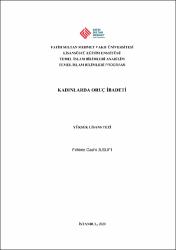Kadınlarda Oruç İbadeti
Künye
JUSUFI, Fehime Gashi, Kadınlarda Oruç İbadeti, Fatih Sultan Mehmet Vakıf Üniversitesi Lisansüstü Eğitim Enstitüsü Temel İslam Bilimleri Anabilim Dalı, Yayımlanmamış Yüksek Lisans Tezi, İstanbul 2020.Özet
İslâm dininin en temel ibadetlerinden biri olan oruç, yeme içme ve cinsel ilişkiden belli süre uzak durmayı ifade etmektedir. Belli bazı şeyleri yapmaktan kaçınma anlamına gelen oruç/imsak hem İslâm’da hem de İslâm öncesi diğer dinlerde var olan bir ibadettir. Oruç aynı zamanda hem beden hem de ruhu arındırma gibi önemli fonksiyonları olan bir ibadet biçimidir.
Oruç bir ibadet olarak mükellef bütün Müslümanlara farz kılınmıştır. Bu farzın yerine getirilmesi esnasında kadın ve erkek eşit olmakla beraber kadınlara belli ruhsatlar sunulmuştur. Bu çalışmada kadınlara sunulan ruhsatlar oruç özelinde incelenmiştir. Kadınların hangi durumlarda oruç tutmayacakları veya oruçlarını bozduklarında keffâretin gerekip gerekmediği çalışmamızın temel konusudur. Özellikle hamilelik, emzirme ve kadınların özel halleri yani hayız, nifas ve istihâze kanı görmeleri durumunda oruç tutup tutmayacakları ele alınacaktır. Bu meselelere dair verilen hükümler hem mezheplerin kendi içinde hem de mezhepler arasında farklılaştığı için temelde Hanefî ve Şâfiî mezhebi üzerinden ele alınmıştır.
Tezde incelenecek diğer bir temel mesele ise günümüzde kadınların özel hallerinde oruç tutmaları gerektiğini savunan kişilerin görüşleri ile buna verilen cevaplar olacaktır. Bu görüşü savunan kişilerin iddiaları çoğunlukla Türkiye özelinde ele alınacaktır. Kişilerin ne tür iddiaya sahip oldukları, bu iddilarını nasıl delillendirdikleri, buna kimlerin karşı çıkıp akademik anlamda cevap verdiğini ve bu cevapların gelenekte ifade edilen görüşlerle uyuşup uyuşmadığı irdelenecektir Fasting, which is one of the most basic prayers of the Islamic religion, means to stay away from eating, drinking and sexual relations for a certain period of time. Fasting / imsak, which means avoiding doing certain things, is a form of worship that exists in both Islam and other pre-Islamic religions. Fasting is also a form of worship that has important functions such as cleansing both body and spirit.
In terms of fasting worship, all taxpayers were assumed. During the fulfillment of this assumption, although men and women are equal, women are given certain licenses. In this study, the licenses offered to women were examined in a special way of fasting. The main issue of our study is in which cases women will not fast or whether or not they need disaster when they break their fast. Particularly, pregnancy, breastfeeding and special cases of women, namely, if they see blood, nifas and blood of recovery, will be examined whether they will fast. Since the provisions on these issues differ both within the sects and among the sects, they are mainly dealt with through the Hanafi and Shafii sects.
Another main issue to be examined in the thesis will be the opinions of the people who advocate that women should fast in their private situations and the answers given to them. The proponents of this view is mostly of the claims will be handled by Turkey's private. It will be examined what kind of claims people have, how they prove these claims, who opposes this and responds academically, and whether these answers match the views expressed in the tradition.



















